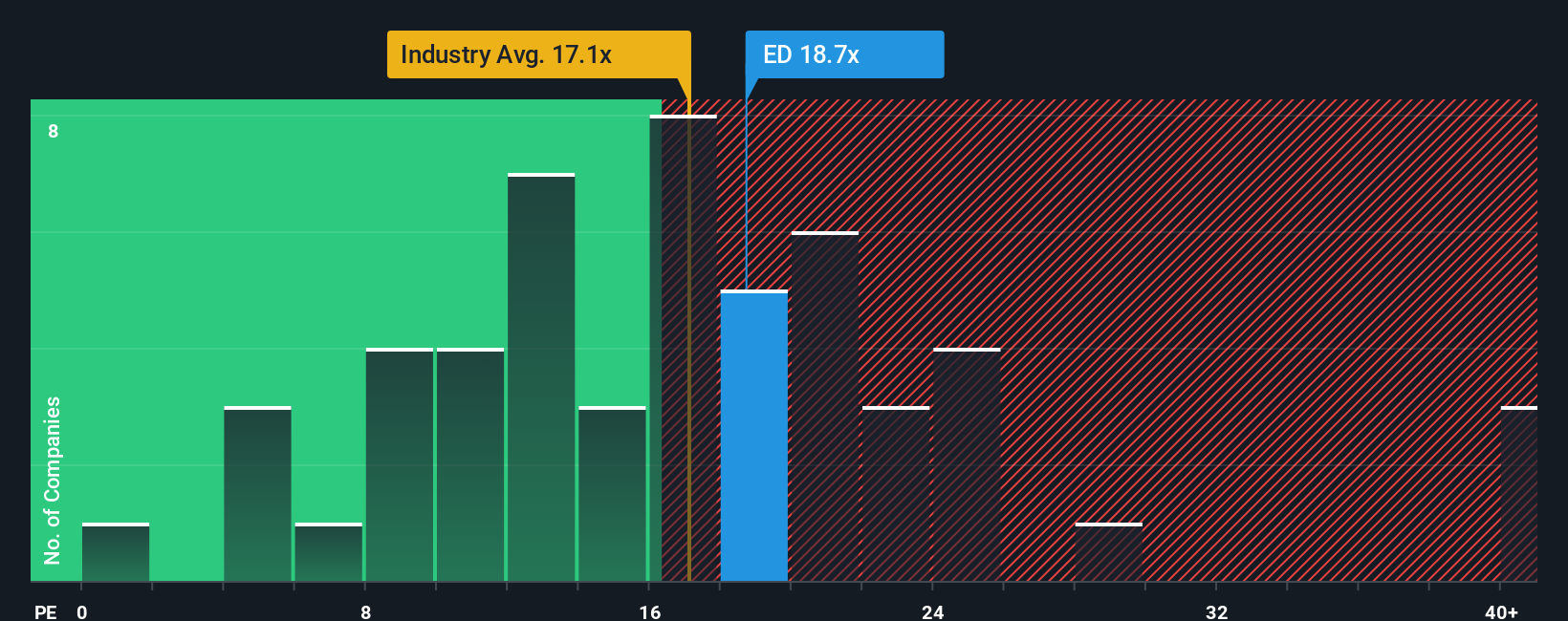- United States
- /
- Other Utilities
- /
- NYSE:ED
Consolidated Edison, Inc.'s (NYSE:ED) Price Is Out Of Tune With Earnings
It's not a stretch to say that Consolidated Edison, Inc.'s (NYSE:ED) price-to-earnings (or "P/E") ratio of 18.7x right now seems quite "middle-of-the-road" compared to the market in the United States, where the median P/E ratio is around 18x. Although, it's not wise to simply ignore the P/E without explanation as investors may be disregarding a distinct opportunity or a costly mistake.
Consolidated Edison's earnings growth of late has been pretty similar to most other companies. It seems that many are expecting the mediocre earnings performance to persist, which has held the P/E back. If this is the case, then at least existing shareholders won't be losing sleep over the current share price.
See our latest analysis for Consolidated Edison

Is There Some Growth For Consolidated Edison?
Consolidated Edison's P/E ratio would be typical for a company that's only expected to deliver moderate growth, and importantly, perform in line with the market.
If we review the last year of earnings growth, the company posted a worthy increase of 4.3%. EPS has also lifted 21% in aggregate from three years ago, partly thanks to the last 12 months of growth. Accordingly, shareholders would have probably been satisfied with the medium-term rates of earnings growth.
Looking ahead now, EPS is anticipated to climb by 5.6% per year during the coming three years according to the twelve analysts following the company. That's shaping up to be materially lower than the 10% each year growth forecast for the broader market.
With this information, we find it interesting that Consolidated Edison is trading at a fairly similar P/E to the market. Apparently many investors in the company are less bearish than analysts indicate and aren't willing to let go of their stock right now. Maintaining these prices will be difficult to achieve as this level of earnings growth is likely to weigh down the shares eventually.
The Key Takeaway
It's argued the price-to-earnings ratio is an inferior measure of value within certain industries, but it can be a powerful business sentiment indicator.
Our examination of Consolidated Edison's analyst forecasts revealed that its inferior earnings outlook isn't impacting its P/E as much as we would have predicted. Right now we are uncomfortable with the P/E as the predicted future earnings aren't likely to support a more positive sentiment for long. This places shareholders' investments at risk and potential investors in danger of paying an unnecessary premium.
Before you take the next step, you should know about the 2 warning signs for Consolidated Edison (1 doesn't sit too well with us!) that we have uncovered.
It's important to make sure you look for a great company, not just the first idea you come across. So take a peek at this free list of interesting companies with strong recent earnings growth (and a low P/E).
New: AI Stock Screener & Alerts
Our new AI Stock Screener scans the market every day to uncover opportunities.
• Dividend Powerhouses (3%+ Yield)
• Undervalued Small Caps with Insider Buying
• High growth Tech and AI Companies
Or build your own from over 50 metrics.
Have feedback on this article? Concerned about the content? Get in touch with us directly. Alternatively, email editorial-team (at) simplywallst.com.
This article by Simply Wall St is general in nature. We provide commentary based on historical data and analyst forecasts only using an unbiased methodology and our articles are not intended to be financial advice. It does not constitute a recommendation to buy or sell any stock, and does not take account of your objectives, or your financial situation. We aim to bring you long-term focused analysis driven by fundamental data. Note that our analysis may not factor in the latest price-sensitive company announcements or qualitative material. Simply Wall St has no position in any stocks mentioned.
About NYSE:ED
Consolidated Edison
Through its subsidiaries, engages in the regulated electric, gas, and steam delivery businesses in the United States.
Good value average dividend payer.
Similar Companies
Market Insights
Community Narratives



